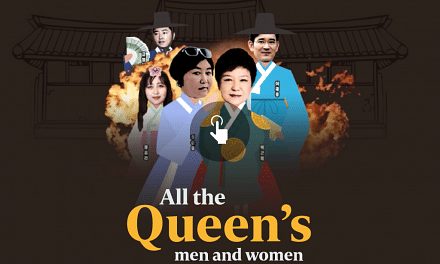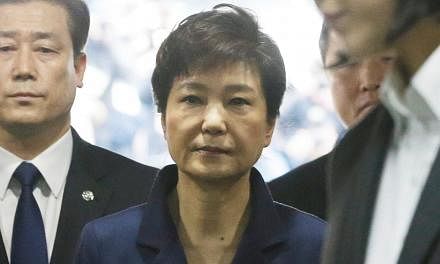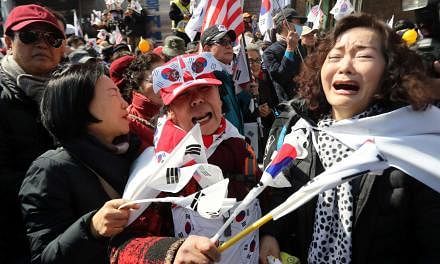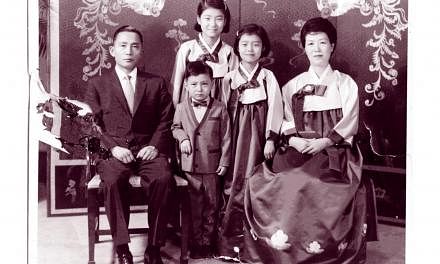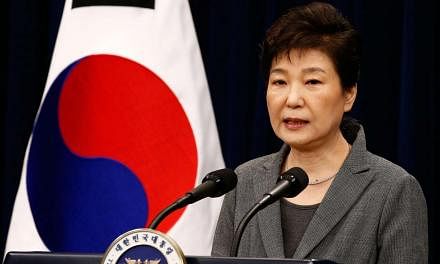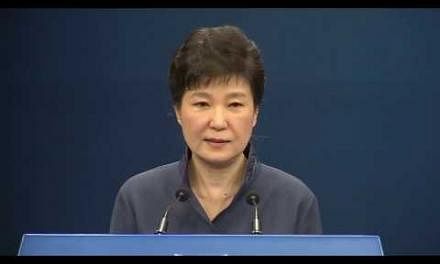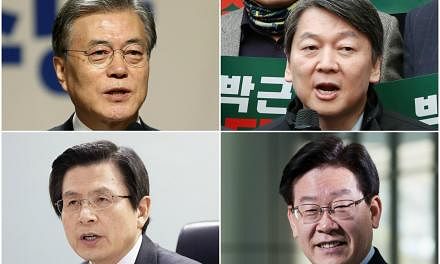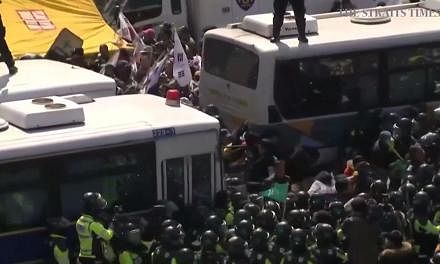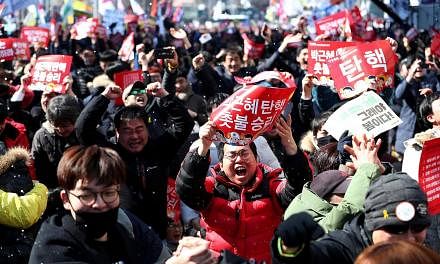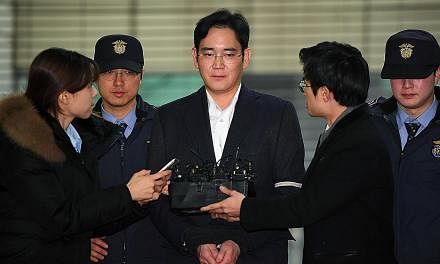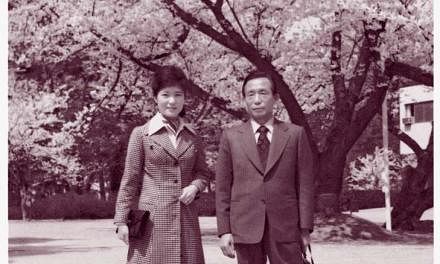SEOUL (BLOOMBERG) - The bizarre scandal engulfing South Korea's President Park Geun Hye could hardly have come at a worse time for the country's economy.
The nation's biggest company is trying to control the damage from cancelling its flagship product, its largest container shipper went into receivership, the head of its biggest retailer has been indicted on charges of embezzlement, exports are slumping, household debt is rising, and now this.
Just when the Asian industrial dynamo needs strong leadership, accusations of influence-peddling have sparked calls for Ms Park to resign along with the prime minister and several Cabinet members.
Crowds filled the main streets of Seoul at the weekend, demanding her removal while lawmakers called for the appointment of a neutral government to run the country. In an effort to stem the fallout, Ms Park named a new prime minister and finance minister on Wednesday (Nov 2).
"Having no control tower for economic policies would not have mattered much during an economic boom, but it's worrying when policy coordination is needed," said Jun Sung In, a professor of economics at Hongik University in Seoul. He said key issues that could suffer from a lack of direction include the global fallout from a looming interest rate rise by the US Federal Reserve, and Korea's efforts to restructure its big indebted ship companies.
South Korea's government is predicting the economy will improve next year, expanding by close to 3 per cent. Meeting that target may be more difficult if the country faces an extended period of political uncertainty until Ms Park's single term as president ends in February 2018, said Mr Scott Snyder, senior fellow for Korea studies and director of the programme on US-Korea policy at the Council on Foreign Relations.
Ms Park's approval rating slid to a record 17 per cent, according to a Gallup Korea poll released October 28.
Government officials in South Korea said that agendas like corporate restructuring where ministries may have different opinions or interests require a strong push from the presidential office to be implemented. That office is now deeply mired in a political intrigue that has staggered the world.
The allegations concern Ms Park allowing her old friend, Ms Choi Soon Sil, a private citizen, to meddle with state affairs. Ms Choi appeared at the prosecutor's office on Monday (Oct 1) following accusations that she helped make Budget and staff decisions and cajoled a business lobby group to raise money for two foundations she controls. She was later formally detained.
The scandal has evoked public furore amid speculation that Ms Choi - whom some opposition lawmakers have linked to a religious cult - used her influence with Ms Park to benefit herself, acquaintances, and family members.
Ms Park made a public apology on October 25 for allowing Ms Choi to review certain speeches.
With little over a year left, Ms Park has struggled to push through reforms to deal with South Korea's big structural economic problems, such as its aging population, restrictive labour rules and rising competition from China. Yet the country is also dealing with more immediate challenges that could benefit from strong political leadership, such as the collapse of Hanjin Shipping Co and the crisis at Samsung Electronics Co.
"As her popularity sinks to new lows, it seems even more unlikely that she will be able to pass these reforms," said Mr Kent Boydston, research analyst at the Peterson Institute for International Economics in Washington. "Park will be in for an even more prolonged and weak lame-duck period."
Samsung Electronics had to kill off its flagship Note 7 smartphone after a global recall, at an estimated cost of more than US$6 billion (S$8.34 billion). Shipbuilders and shipping companies have been eliminating jobs and selling non-core businesses after losses mounted. And retail giant Lotte Group has postponed key business initiatives as family members face corruption charges.
The Park scandal has also suspended a more immediate task for Parliament - reviewing and approving the 400.7 trillion won (S$486.71 billion) Budget proposal for 2017. Parliamentary hearings to review the Budget in recent weeks served as a crucible for opposition lawmakers to grill government officials for signs the Budget would sponsor projects by businesses linked to Ms Choi.
The political uncertainty adds to South Korea's economic headwinds. Industrial production fell 2 per cent in September from a year earlier, while exports contracted 3.2 per cent in October from the previous year. Citibank Korea predicts the economy will grow only 0.1 per cent in the fourth quarter, from 0.7 per cent in the previous period.
Still, South Korea's markets have a habit of weathering scandals. In March 2004, lawmakers voted to impeach then-president Roh Moo Hyun for violating election laws. The Kospi index slid in the week leading to the impeachment vote, but recovered within a month. The impeachment was rejected by the Constitutional Court a few months later.
The economy too, has been resilient to shocks, including attacks from North Korea and a wave of national grief after the Sewol ferry disaster. In Ms Park's case, some analysts say that the scandal may have little long-term effect on the economy as her popularity - and ability to enact reforms - had already fallen.
"Influence peddling and big money being passed around under the table haven't exactly been rarities in South Korean politics," said Mr Boydston at the Peterson Institute.
The concern for South Korea is that the crises at its big companies and the structural problems in the economy will get worse during a power vacuum. The won weakened 3.7 per cent versus the dollar in October and the Kospi stocks index slid 1.7 per cent, among the worst performances in the region.
"History shows economic crises tend to happen when there is political chaos, as politics take over the attention needed on the economy," said Kim Jung Sik, a professor of economics at Yonsei University in Seoul.

